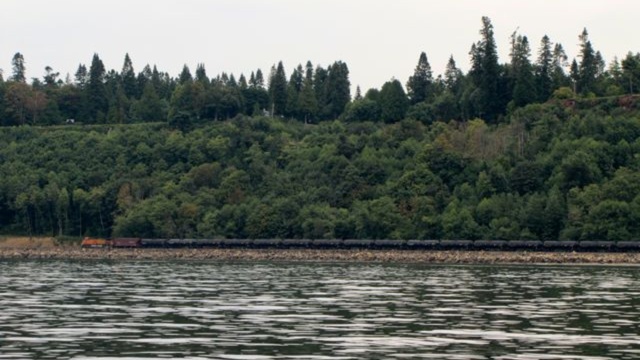By Tony Schick, OPB
The U.S. Department of Transportation has issued an emergency order requiring crude oil from North Dakota and Montana to be tested before being transported by railroads.
Tuesday’s order follows several fiery derailments involving shipments of crude oil. It is intended to ensure greater safety when the highly flammable liquid is being shipped.
Federal regulators also said Tuesday they are prohibiting shipping oil using the least-protective packing requirements.
The order is a response to derailments of trains carrying oil from the Bakken region in North Dakota that resulted in explosions and fire, including a train that exploded in Lac-Megantic, Quebec, near the U.S. border, in July, killing 47 people.
Jerry Vest, Vice President for Government & Industry Affairs at Genesee & Wyoming railroad, called the order a fundamental step to ensure safety. Genesee & Wyoming owns the Portland & Western rail line carrying Bakken crude to a terminal at Port Westward near Clatskanie, Ore. Last year, 110 unit trains carried Bakken crude to Port Westward, each one carrying about 70,000 barrels.
Vest clarified that the commodity would be tested not by the railroads but by companies using the railroads to ship the oil.
Sen. Ron Wyden, D-Ore., said the new rules will help, but won’t eliminate the risks posed by oil-by-rail shipments.
There is far more work to be done on securing the safety of oil trains, but this is one step of many that can be part of a solution,” Wyden said in a written statement.
Shippers already had to classify oil shipments based on their risk for explosion or fire, but federal investigators found that many shipments were being misclassified as less dangerous. The order requires testing for classification before shipment.
Jay Tappan, Chief of Columbia River Fire and Rescue, said his department has been waiting for stricter federal rules to help his responders know how to handle an oil train fire.
“I think we’re all finally starting to understand that the Bakken crude is a little bit more volatile, little more flammable than we had thought before so it’s good that they’re getting a handle on the exact classification of that commodity,” Tappan said.
Better classification of the Bakken crude was one of many issues raised at a January meeting between railroads, first responders and Oregon senators Ron Wyden and Jeff Merkley in Portland. Local responders and state spill and emergency planners had previously received little information from railroads and oil companies about shipments of crude oil through their areas.
Tappan’s is one of many fire departments in the Pacific Northwest preparing for the risk of an oil train derailment. A port in Oregon and five refineries in Washington currently accept rail shipments of crude oil. Several other shipping terminals have been proposed in the region.
The Associated Press contributed to this report.




